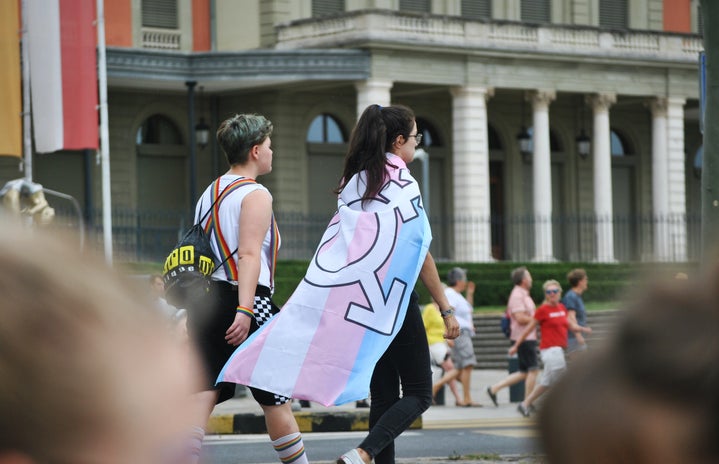The first person I came out to was my middle school guidance counselor. My hometown was small, rural and held deeply conservative values. Growing up in that space, it felt like saying “I’m gay” would only ensure my social isolation. I knew my friends and family would not be supportive, and I was unsure whether it was even safe to come out. I was worried I would be kicked out of my house if my parents knew. But at the same time, it was so hard to keep it to myself. I felt like I needed to tell someone. My guidance counselor was someone that I could trust, and When I came out to her, she showed me kindness and support I did not have elsewhere.
My guidance counselor continued to support me for another five years. She gave me resources and encouraged me to take opportunities I was too scared to pursue. She inspired me to apply for LGBTQ+ scholarships and write about my experience. When I was terrified to come out to my parents, she let me use her office. She genuinely changed my life, and when I gave my address as senior class president, I credited her as the person who had helped me the most.
Recently, there has been a stream of laws out of state legislatures that limit the discussions of LGBTQ+ topics in schools. Infamously, the “Parental Rights in Education” bill (more commonly referred to as the “Don’t Say Gay” law) was signed by Florida’s Governor DeSantis in late March. The law prevents discussion of LGBTQ+ topics in elementary schools and allows parents to sue schools that violate this law. Other states like Ohio, Texas and Kansas are following suit. Oklahoma is banning books related to sex, sexual identity and sexual orientation. Tennessee is going so far as to ban any books “that promote, normalize, support, or address lesbian, gay, bi-sexual, or transgender issues or lifestyle” (Griffey).
Lawmakers are writing these bills with the perception that they are protecting children. They believe that the decision to introduce children to LGBTQ+ topics should be up to parents. They believe discussions of gender identity, same-sex relationships, and gender expression are too inappropriate for young children. They believe it is impossible for LGBTQ+ topics to be unsexual.
What is it they are truly trying to protect these children from? The answer is simple: these bills are trying to prevent kids from being gay.
It’s time we stop vilifying queer people. Talking about LGBTQ+ matters is not inherently indecent. Conversations related to the LGBTQ+ community are not inherently sexual. Thousands of children living in these states have gay parents. Many children know they are LGBTQ+ from a young age. Regardless if they have been exposed to LGBTQ+ concepts, many children will grow up to identify as LGBTQ+.
As a young queer person, I am terrified that these laws require school officials to notify the parents if a child comes out at school. Schools (especially publicly funded institutions) need to be safe places for LGBTQ+ students. Children need to have a space separate from their parents and guardians to seek the support they need. Being in the closet can cause anxiety, depression and feelings of loneliness. The more people reach out, the more these effects are lessened.
If these laws had been in place when I was in school, I wouldn’t have come out. I can only imagine where I would be today if I had not felt safe enough to come out to my guidance counselor. Coming out to even one person significantly raised my self-esteem. I felt more confident and more secure in my identity. She showed me that I was more than just a gay kid in a small town. She showed me that I had potential.
I worry that these laws will limit the potential of queer and trans kids around the country. “Don’t Say Gay” bills prove that homophobia and transphobia are still rampant in the United States. After a decade of milestones in LGBTQ+ tolerance, it is heartbreaking to watch society progress backward. However, I commend the educators speaking out against these laws and the school officials who ensure their students have safe spaces in their schools. Sometimes all somebody needs to flourish is someone who cares about them: someone who loves and supports them for who they are.
Citation: Tennessee, Congress, House of Representatives, and Bruce I. Griffey. House Bill 800, 2021.


